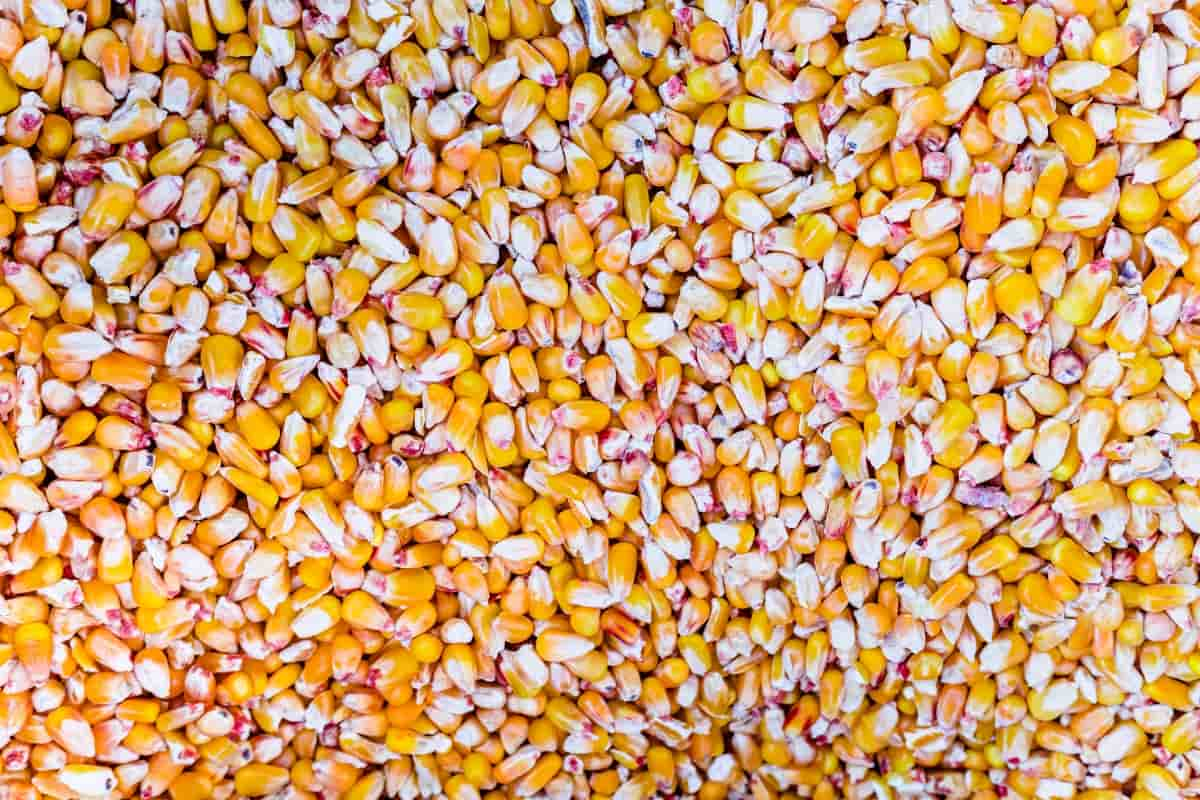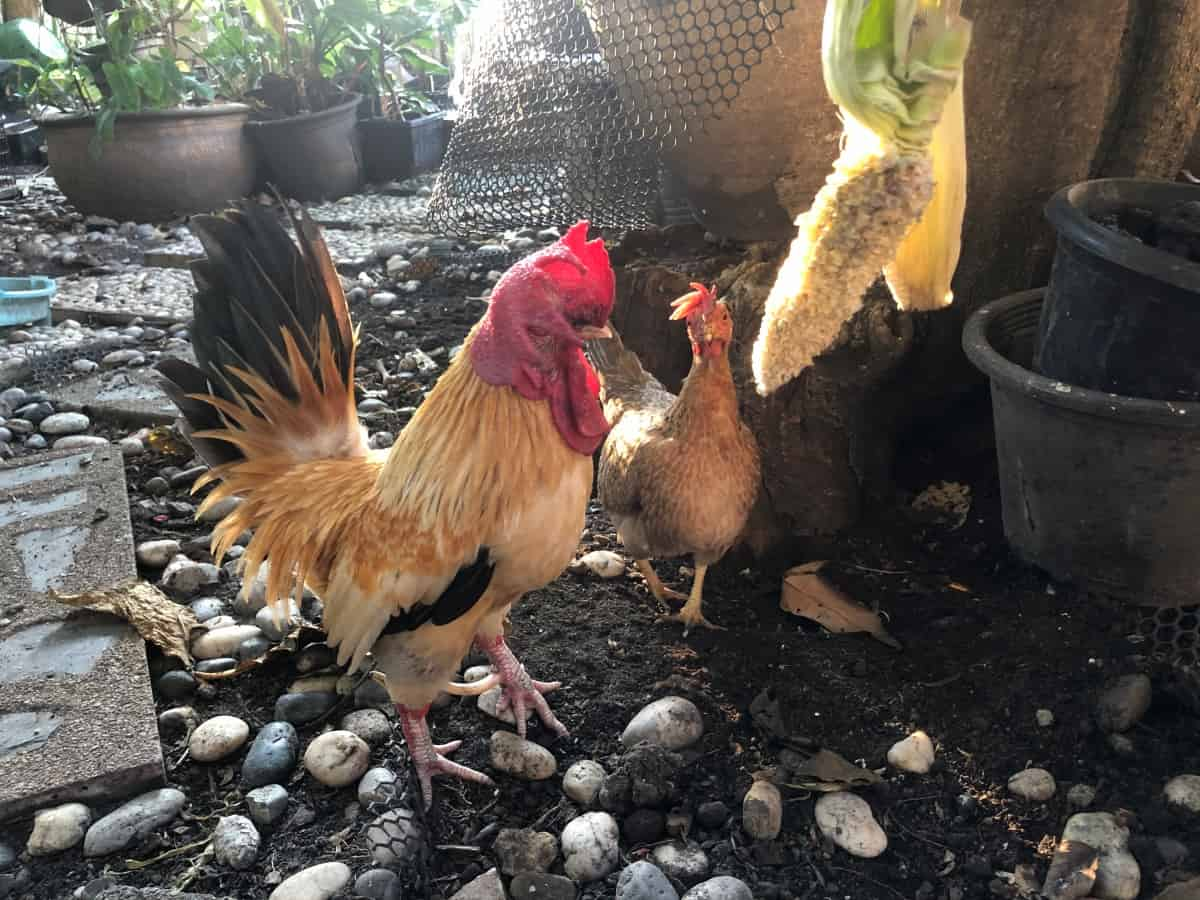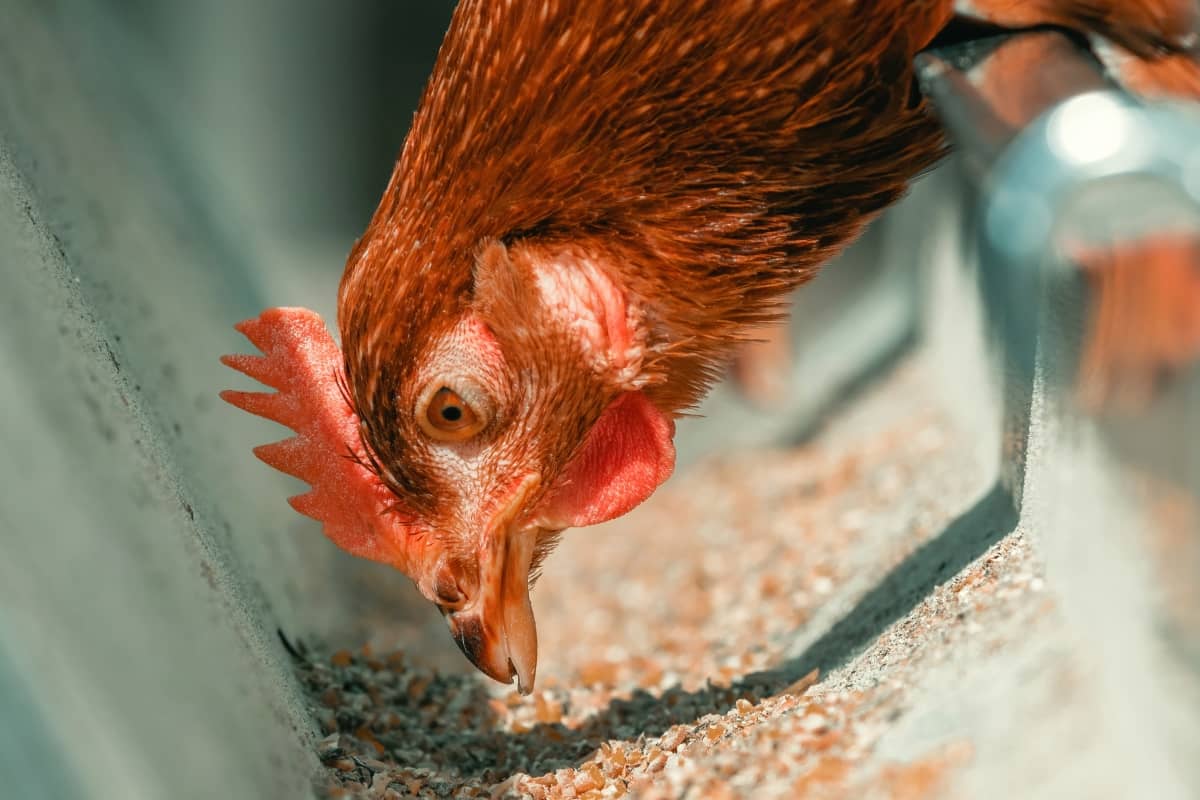Raising chickens has become increasingly popular, both in urban and rural settings. In addition to providing a sustainable source of fresh eggs, raising chickens can be an environmentally friendly and cost-effective way to manage food waste. One popular feed option for chickens is corn, an inexpensive and readily available energy source. Below we learn about feeding corn to your chickens, addressing important topics such as how much to feed your chickens per day, methods of feeding, and how much corn should be fed daily.

Feeding Corn to Chicken
The Nutritional Benefits of Corn for Chickens
Corn is a popular feed choice for chickens because of its high energy content, which comes primarily from carbohydrates. It is also a good source of certain vitamins and minerals, such as vitamin A, B-complex vitamins, and essential fatty acids. But it’s important to know that corn isn’t very high in protein and some necessary amino acids that your birds need to grow and stay healthy. Therefore, balancing corn with other feed sources is crucial to provide a complete and balanced diet.
How Much Corn to Feed Chickens per Day in Kilograms
The amount of corn you should feed your chickens depends on several factors, including the size and age of the birds, the purpose of raising them (e.g., egg production, meat production, or both), and the quality of the corn. As a general guideline, laying hens require about 120 grams of feed per bird per day, while meat chickens may require up to 200 grams per day. This translates to approximately 0.12 to 0.2 kilograms of feed per chicken daily. However, since corn is not a complete feed, it should only make up a portion of your chickens’ daily intake.
Balancing Corn with Other Feed Sources
To ensure that your chickens receive a balanced diet, it is essential to supplement their corn intake with other feed sources. These may include soybean meal, which is high in protein and essential amino acids, and other grains such as wheat, barley, or oats. For strong eggshells, chickens also need a good source of calcium. You may need to give them a different source of calcium, like crushed oyster shells or limestone.
Methods of Feeding Corn to Chickens
Whole corn: Feeding whole corn to chickens is easy to store and less prone to spoilage. However, it can be difficult for some chickens to digest, particularly if they are young or have limited access to grit, which helps them grind down the whole kernels. If you choose to feed whole corn, ensure your chickens have access to a source of grit.
Cracked corn: Cracked corn is whole corn that has been broken into smaller pieces. It is easier for chickens to digest than whole corn but can spoil more quickly due to increased surface area. To avoid spoilage, store cracked corn in a cool, dry, and well-ventilated area, and only purchase as much as you can use within a few weeks.
Ground corn: Ground corn is corn that has been finely milled into a flour-like consistency. It is the easiest form for chickens to digest and can be easily mixed with other feed ingredients. However, ground corn is more susceptible to spoilage and can become contaminated with mold and mycotoxins if not stored properly.
How Much Corn to Feed Chickens Daily
As a general rule, corn should make up no more than 50% of your chickens’ daily feed intake. For laying hens, this would be approximately 60 grams of corn per bird per day, while meat chickens could be up to 100 grams per day. Remember that these are simply suggestions and that your bird’s specific requirements may vary based on age, size, and degree of activity.
In case you missed it: Feeding Corn to Cattle: A Step-By-Step Guide

Monitoring Your Chickens’ Health and Adjusting Feed Intake
It is important to regularly observe your chickens’ health and behavior to ensure that their dietary needs are being met. Signs that your chickens may not be receiving enough nutrients include reduced egg production, poor feather condition, and lethargic behavior. Any of these symptoms might indicate that your hens need a change in their diet.
In addition to monitoring your chickens’ health, you should regularly weigh them to maintain a healthy weight. Chickens that are either too fat or too skinny may not get the nutrition they need. Adjust the amount of feed you provide based on your chickens’ weight and overall health.
Properly Storing Corn and Other Feed Ingredients
Corn and other feed materials lose quality and safety if not stored correctly. Corn must be kept in a dark, dry, airy place, out of the rain and sun. Keep corn off the ground and away from pests and rodents to prevent contamination. Check your corn regularly for signs of spoilage, such as mold or a musty smell, and discard any contaminated feed immediately.
Adapting Your Feeding Strategy to Changing Seasons and Environmental Conditions
The nutritional needs of your chickens may change with the seasons and environmental conditions. For example, during cold weather, your chickens may require more energy to maintain their body temperature, and you may need to increase the amount of corn in their diet. Similarly, during periods of high heat and humidity, chickens may consume less feed, so it’s essential to provide a nutrient-dense diet to meet their needs.
Supplementing with Kitchen Scraps and Garden Waste
In addition to corn and other feed ingredients, you can supplement your chickens’ diet with kitchen scraps and garden waste. However, be cautious about the types of scraps you provide, as some foods can be harmful to chickens. For example, avoid feeding chickens raw potatoes, avocado, chocolate, or any moldy or spoiled food.
In case you missed it: Feeding Corn to Pigs: A Step-By-Step Guide

Conclusion
Feeding corn to chickens can be an economical and sustainable way to provide them with the energy they need to thrive. Remember to monitor your chickens’ health, adjust feed intake as needed, and provide a variety of feed sources to meet their nutritional needs. With proper care and attention, your chickens will reward you with fresh eggs and a sustainable source of homegrown protein.
- Feed Your Flock for Less: Top 10 Tips to Save on Chicken Feed
- Ultimate Guide to Ossabaw Island Hog: Breeding, Raising, Diet, and Care
- Hatching Answers: The Top 10 Reasons Your Chickens Aren’t Laying Eggs
- Eggs and Economics: Breaking Down the Cost of Raising Backyard Chickens
- Defend Your Greens: Proven Methods to Keep Iguanas Out of Your Garden
- Ultimate Guide to Cinnamon Queen Chicken: A Comprehensive Guide for Beginners
- Ultimate Guide to California Tan Chicken: Breeding, Raising, Diet, Egg-Production and Care
- Ultimate Guide to Marsh Daisy Chicken: Breeding, Raising, Diet, and Care
- 10 Types of Chicken Farming Businesses You Can Start for Profits